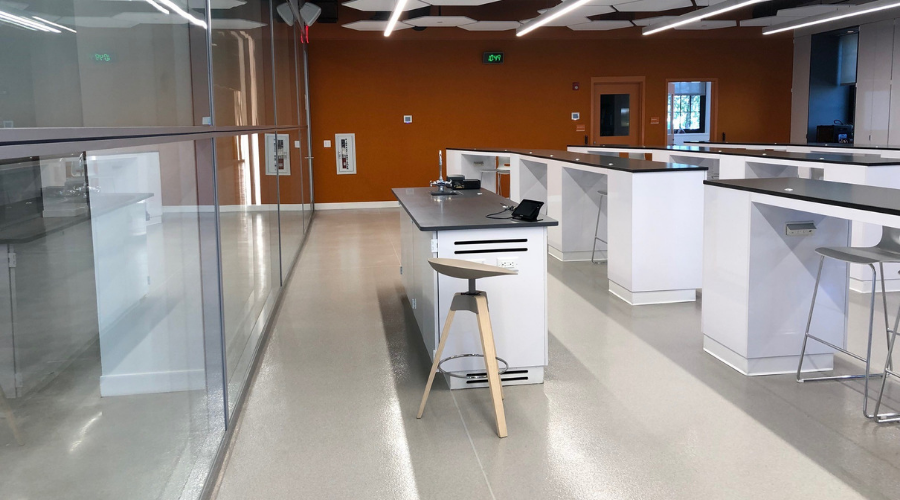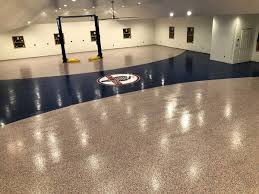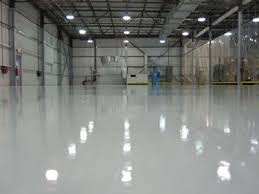Benefits Of Epoxy Flooring
Whether you need to refurbish outdated flooring or seal your concrete surface, epoxy floor coating can transform your space while fortifying your flooring. This floor coating is surprisingly useful for preserving concrete surfaces and protecting against harsh impacts — all while showcasing a glossy finish. Coating the floor of an auto shop, room or garage has many benefits. Epoxy floor coating is resilient and seals your floor, bringing safety and beauty to any well-trafficked area. If your floor is uncoated and has been left open to damage, epoxy can shield your floor from any further damage and bring a level of professional refinement it may be lacking.
What Is Epoxy Floor Coating?
Epoxy floor coating is made of epoxide resin, polyamine hardener and other additives. When not used as a floor coating, it is often used as an adhesive. As it is mixed, it forms a chemical reaction that gives your floor distinct qualities. One of the most important qualities that this chemical reaction produces is new stability and endurance in the surface. This process seals and cures the surface it is applied to, forming a firm bond. Check out the advantages of epoxy floor coatings to determine if this is the right choice for your space.

Here are the major benefits of installing epoxy coating in your building:
- Durability: Concrete floors coated in epoxy last longer and resist considerable wear, thus saving you money and allowing you to manage other business concerns.
- Strength: Once the epoxy has been converted to a solid polymer, it becomes incredibly strong and prevents chemical breakdown.
- Saves time: Epoxy flooring is usually quickly and easily installed, which means less time shutting down production for installation.
- Low maintenance cleaning: Once concrete has the epoxy coating, it is no longer porous since sealed and is therefore easier to clean.
- Aesthetic: Coatings are usually available in an array of colors and patterns to fit your specific style.
- Chemically resistant: Epoxy coatings can survive continued exposure to potent chemicals, which is perfect for warehouses or plants that may be exposed to such materials.
- Safety: These coatings are also resistant to slippage, temperature, extreme impact and even fire, maintaining both the safety of your employees and your building.
- Brightness: Typically, a high gloss option for coatings can be provided, which improves lighting in your facility to a significant degree due to reflection.
- Lowers vehicle maintenance: Choosing an epoxy coating can also reduce wear on vehicles in your facility because it is more forgiving on machinery.
- Helps the environment: Lastly, epoxy coatings are a green option for your business because of the reduction in material usage. It is a great alternative to adding on a completely new floor or replacing vehicles due to damage.

Cons of Epoxy Floor Coatings
Epoxy Can Be A Hassle to Apply
Epoxy floor coating doesn’t require a lot of intensive labor to install it, but the trade-off is the necessity for specific conditions of the surrounding environment during install. First, the existing floor that the epoxy will be applied to needs to be thoroughly cleaned to remove any oil, dirt, or other residues, and the floor needs to be smoothed out as much as possible. Any defects in the floor will affect the epoxy coating. Next, the pitch and hardener have to be mixed correctly or the solution won’t cure properly. Finally, if the environment is too moist, the epoxy won’t adhere correctly. This is a problem that is especially concerning for applications such as storm cellars, which may never be dried out enough for the epoxy to adhere. The good news is our team of specialists have mastered the art of concrete coating installations.
Dropping Heavy Objects May Cause Epoxy to Chip
Despite its durability under most circumstances, epoxy is vulnerable to chipping. Repeated stress from sudden contact with heavy objects is the most prevalent cause of chipping. As a result, epoxy isn’t the best choice for an environment where the floor will sustain frequent abuse from heavy objects.
Epoxy Has A High Level of VOCs
Although epoxy is perfectly safe when it’s dry, while it’s still wet it can emit fumes containing volatile organic compounds (VOCs). To avoid inhaling the potentially harmful fumes, appropriate protection such as a mask and gloves should be used during the installation process.
Exposure to UV Rays Can Cause Epoxy to Yellow
Lastly, using an epoxy coating isn’t appropriate in a location that’s frequently exposed to direct sunlight. UV rays cause epoxy to turn yellow over time, which alters the color of the flooring if it receives too much sunlight.

Cleaning Epoxy Floors
For a long-lasting epoxy floor, follow the recommended cleaning procedures. Using rough brushes or pads will abrade the surface and remove the coatings/sealers. The cleaner you keep your floors, the longer they will last because dirt, sand, and other particles will not be worn over the surface (in essence, like sandpaper). Despite the durability of epoxy floors, it is still possible for continuous use on the surface to cause damage. If your epoxy floor begins to show damage due to abuse, it is important to repair the issue so that the damage does not spread. A reputable flooring company will provide you with a warranty. Recoating and retexturing as needed will keep the floor in good condition and prevent the base system from being worn down.
Epoxy Floor Coating Preparation
An epoxy coating requires a clean and slightly porous surface to adhere properly. Epoxy may not bond to sealed or polished concrete. The concrete also must be fully cured. Before apply epoxy floor coating, it is important to patch and repair all major cracks and chips in the concrete surface and to remove all grease.
If the concrete is old, test the surface for previous layers of epoxy or other products that might have been applied over the years. To test for sealant, pour a small amount of water onto the floor. It should soak in. If the water beads on the surface rather than soaking in, it likely has been sealed and may not be suitable for an epoxy coating.
Before applying an epoxy coating, make sure that the temperature is suitable, and follow all manufacturer’s recommendations. Unfavorable temperatures can cause the epoxy to bubble and peel. Epoxy is a two-part liquid that you mix before application. Once the product is mixed, you have a limited time to apply the epoxy coating before it starts to harden.